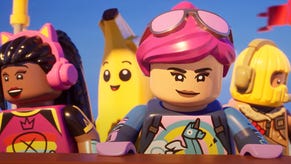Fortnite will let you hide "confrontational" emotes, including the game's most popular
Don't laugh
Royale-battler Fortnite will soon allow players to hide a handful of emotes the developers concede are "sometimes used in confrontational ways". This includes the emote reported as the most-used in Fortnite's seven-year history. That's either a worrying indictment of the game's players, or a (more?) worrying indictment of universal human psychology. What is the offending animation? Well, turns out people don't like being laughed at.
"Laugh it up" is the emote that stands out among those being quietly hidden, often deployed as a post-kill taunt. It's the most popular emote to have graced the long de-llamafied pastures of Fortnite, having been used approximately 78.4 million times according to stats aggregator fortnite-replay.info.
It'll be easy enough to hide, according to a post by the developers. Players will be able to change an option marked "See Confrontational Emotes" so that they never have to witness the offending animation. Or they can change it so only friends can visibly perform the emote. You'll still be able to use the emote, if you're so inclined, but what your raucous laughter looks like in-game to others will be altered; your character will simply be "standing still".
Alongside the laughing emote, three others qualified for the "confrontational" filter. "Take the L" is a dorky dance featuring the dreaded loser's L to the forehead. "Whipcrack" is - surprise surprise - a snapping whip. And "Make It Plantain" is an animation that releases a flurry of bananas in the style of a rich jerk flourishing cash. The general theme seems to be anything that evokes humiliation and/or suggestiveness. Here's a short video showing the emotes in action. It's not yet clear if other emotes will join those already on the naughty list.
Any victim of "teabagging" (the behaviour in a multiplayer FPS that sees players crouching over a corpse in a weird act of dominance) may relate to the irritability a taunt can provoke. I never enjoyed that, but I do find it morbidly interesting how toxic acts of communication propagate in online games, even when you remove the ability to speak aloud. I'm not sure shadow-banning emotes is a permanent solution to that problem (or if a permanent solution exists). But if it makes some player's games a little less toxic, then fair play.
This isn't the first time Fortnite's emotes have made the news, mind. Some emotes were the subject of lawsuits by dance move creators from 2018 onwards, though many of those cases have since been dropped or put on hold.
















